
Will new air travel restrictions keep travellers closer to home?
Synovate surveyed 1,481 people in the United States, United Kingdom, Czech Republic, Hungary, Bulgaria, Singapore and Australia who have travelled by air in the past year to get their thoughts on the additional air travel security restrictions that have been imposed in recent weeks due to threats of terrorism.
Regardless of the tighter security measures now in place at airports, many people still expect that there will be terrorist activity on an aircraft. Almost half of travellers surveyed across all markets believe that an onboard terrorist act will take place sometime in the near future. This feeling is strongest in the UK with 67 per cent, followed by Australia at 58 per cent and the US at 56 per cent.
Respondents from Singapore and the UK are the most skittish about travelling by air specifically because of terrorism concerns. Thirty-eight per cent of Singapore respondents and 30 per cent of UK respondents indicated that the current threat of terrorism will actually deter them from travelling by plane.
"With the recent fifth anniversary of the September 11 attacks on the World Trade Center in New York City, it's not surprising that travellers in the US are still a little nervous about air travel," said Sheri Lambert, Senior Vice President of Synovate's Travel & Leisure group. "No matter how tight airport security gets, the idea that planes could potentially be used for terrorist attacks is now firmly planted in everyone's minds," Lambert added. "The reality is that 9-11 has changed the way we travel for the rest of our lives."

The new airport security measures are also having some effect on consumers' views regarding air travel. Respondents in Singapore and the US indicated that they are now less keen about travelling internationally due to the new security requirements. Twenty-three per cent of air travellers in Singapore and 22 per cent in the US said that the new restrictions will actually deter them from travelling outside their country. Surprisingly, only 15 per cent of respondents in the UK, which has extremely stringent requirements at airports, indicated that the new security rules would deter their international travel, which indicates that it's mostly business as usual for them.
Seventeen per cent of air travellers across the globe also said that the new security requirements will actually deter them from travelling by plane for leisure, and 10 per cent indicated that they were less likely to travel by plane for business.
Despite concerns about terrorism and the inconvenience of new airport security restrictions, flying is still seen as an attractive means of transportation. Only one-third of respondents believe that flying is less appealing now than it was a few years ago. The US led this thinking with almost half of respondents indicating that air travel is not as appealing as it used to be.

Interestingly, 31 per cent of all travellers surveyed indicated that the "no liquids on board" requirement is "just too much to ask".
"Frustration with the additional requirements is high among some consumers, but this is still a new way for people to travel," said Lambert. "Like all new regulations put into place, travellers will eventually get used to them. However, consistency from airport to airport is critical. If the security measures are consistent, then passengers' comfort with the new measures will increase as well."
CURIOSITIES
> Across all markets except Bulgaria, more respondents said that the new airport security requirements would deter them from travelling for leisure than for business.
> Only 7 percent of respondents in the Czech Republic, Hungary and Bulgaria think that air travel is a less appealing transportation option today compared to a few years ago.
> Almost half of the respondents in Singapore felt that a "no liquids on board" requirement is too much to ask of air travellers.
About Synovate
Synovate, the market research arm of Aegis Group plc, generates consumer insights that drive competitive marketing solutions. The network provides clients cohesive global support and a comprehensive suite of research solutions. Synovate employs over 5,500 staff in 50 countries. More information on Synovate can be found at www.synovate.com.
- Unlocking the value of creativity in advertising: How to bridge the creativity gap15 Apr 13:47
- 4 habits keeping your brand poor26 Mar 16:08
- Understanding consumer mindsets for growth in 202407 Mar 08:52
- South Africa's unemployment nightmare: The burden on its people09 May 10:05
- Global survey shows shrinking trust in internet29 Nov 10:17












